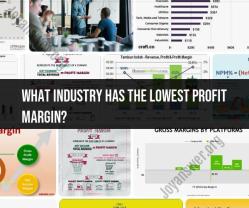What do businesses have a high profit margin?
Businesses with high-profit margins typically operate in industries or niches where they can charge premium prices for their products or services while maintaining relatively low costs. Here are some industries and business types that often have high-profit margins:
Technology and Software: Companies that develop and sell software products, particularly those with a subscription-based model, can enjoy high-profit margins. SaaS (Software as a Service) businesses, for example, benefit from recurring revenue and low distribution costs.
Pharmaceuticals and Biotechnology: The pharmaceutical industry often yields high-profit margins due to the long development timelines, patent protection, and high demand for medications.
Medical Devices: Companies that manufacture and sell medical devices like surgical instruments, diagnostic equipment, or prosthetics can have substantial profit margins.
Luxury Goods: Luxury brands, whether in fashion, accessories, or consumer goods, can charge premium prices based on brand reputation and exclusivity.
Real Estate Development: Real estate developers can profit significantly from the sale of high-end residential or commercial properties.
Digital Marketing and Advertising: Agencies that provide digital marketing, advertising, and SEO services often have high-profit margins because they require minimal overhead and can charge premium fees for their expertise.
Consulting and Professional Services: Management consulting, legal, financial advisory, and other professional services often command high fees, resulting in healthy profit margins.
Intellectual Property and Licensing: Businesses that own valuable patents, trademarks, or copyrights can generate income through licensing agreements, often with limited production or distribution costs.
Coffee Shops and Cafes: Specialty coffee shops that offer premium coffee and food items can have high-profit margins, especially if they cultivate a loyal customer base.
Jewelry and Precious Metals: Jewelry stores and businesses that trade in precious metals like gold and silver often see significant profit margins due to the intrinsic value of the materials.
Gourmet Food and Beverage: Businesses that specialize in gourmet or specialty food and beverage products can charge higher prices for quality and unique offerings.
Health and Wellness Services: Providers of specialized health and wellness services, such as cosmetic surgery clinics, fitness studios, and holistic health centers, can achieve high-profit margins.
E-commerce and Dropshipping: Successful e-commerce businesses that leverage dropshipping, especially in niches with unique or branded products, can enjoy high-profit margins due to lower inventory and fulfillment costs.
Custom Manufacturing and Craftsmanship: Artisanal or custom manufacturing businesses, such as custom furniture makers or high-end car customization, often command premium prices for their craftsmanship.
Waste Management and Recycling: Companies involved in waste management and recycling, especially those focused on recycling valuable materials, can achieve high-profit margins due to environmental considerations and cost-effective processes.
It's important to note that while these industries offer the potential for high-profit margins, success often depends on various factors, including market demand, competition, business strategy, and operational efficiency. Entering an industry with high-profit potential doesn't guarantee success, and careful planning, market research, and effective management are essential for sustainable profitability.
What types of businesses tend to have high profit margins?
Businesses that tend to have high profit margins are those that offer products or services that are in high demand and have a low cost of production. These businesses often have a strong brand name and loyal customer base.
Some examples of businesses with high profit margins include:
- Technology companies: Technology companies often have high profit margins because their products and services are in high demand and have a relatively low cost of production.
- Pharmaceutical companies: Pharmaceutical companies also have high profit margins because their products are in high demand and have a relatively low cost of production.
- Consumer staples companies: Consumer staples companies produce products that people need and use on a regular basis, such as food, beverages, and personal care products. These companies often have high profit margins because their products are in high demand and have a relatively low cost of production.
- Luxury goods companies: Luxury goods companies sell high-end products that are often status symbols. These companies often have high profit margins because their products are in high demand and have a relatively low cost of production.
How can businesses increase their profit margins?
There are a number of things that businesses can do to increase their profit margins, including:
- Reduce costs: Businesses can increase their profit margins by reducing their costs, such as the cost of goods sold, operating expenses, and taxes.
- Increase prices: Businesses can also increase their profit margins by increasing the prices of their products or services. However, businesses need to be careful not to raise prices too high, as this could lead to a loss of customers.
- Sell more products or services: Businesses can also increase their profit margins by selling more products or services. This can be done by expanding into new markets, launching new products, or increasing marketing and advertising efforts.
What are the key factors influencing profitability in various industries?
The key factors influencing profitability in various industries vary depending on the industry. However, some common factors include:
- Competition: The level of competition in an industry can have a significant impact on profitability. Businesses in highly competitive industries often have lower profit margins than businesses in less competitive industries.
- Barriers to entry: Barriers to entry can also affect profitability. Businesses in industries with high barriers to entry often have higher profit margins than businesses in industries with low barriers to entry.
- Demand for products or services: The level of demand for products or services can also have a significant impact on profitability. Businesses that offer products or services that are in high demand often have higher profit margins than businesses that offer products or services that are in low demand.
- Cost of production: The cost of production can also affect profitability. Businesses with a high cost of production often have lower profit margins than businesses with a low cost of production.
Overall, there are a number of factors that can influence profitability in various industries. Businesses that are able to reduce costs, increase prices, sell more products or services, and operate in an industry with high barriers to entry and high demand for products or services are more likely to be profitable.



